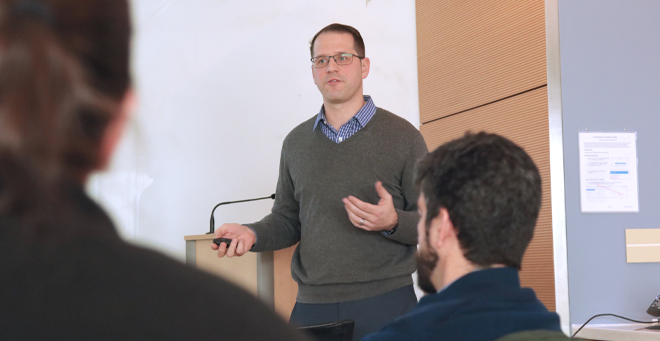
|
The Research Career and Writing Group, known as the “K Club” at UMass Medical School, helps junior investigators obtain early career training grants known as K awards to advance their research. According to the National Institutes of Health, K awards prepare postdoctoral fellows and junior faculty to compete for major grant support and establish independent research programs. More than 80 percent of K Club participants who have applied for these research career awards have received funding from a variety of sources.
“The K community is a key component of our scientific ecosystem,” said David McManus, MD, professor of medicine in the Division of Cardiovascular Medicine. “We are engaging faculty at a critical time and are providing them tools to pursue their career goals.” Dr. McManus and Nancy Byatt, DO, MBA, associate professor of psychiatry, were both K Club members as junior faculty and are now serving as co-directors of the program.
The UMass Center for Clinical and Translational Science established the K Club in 2007 as part of its Clinical and Translational Science Award from the National Institutes of Health. Participants benefit from feedback on their CVs; assistance preparing NIH biosketches; individualized support developing career goals and research programs; grant application writing tips and reviews; and guidance on selecting and working with primary and secondary mentors, mock study section reviews, and how to enhance prior grant applications.
Michelle Trivedi, MD, MPH, said the program provided support for her research on improving treatment for children with poorly controlled asthma. “I started attending before I had solidified my plans to apply for a K award and even just listening to the feedback during the sessions helped me to create a game plan for my preparation,” said Dr. Trivedi, assistant professor of pediatrics in the Division of Pediatric Pulmonology. “Once I began writing, the K Club was a fantastic resource for me to receive direct feedback on my grant writing, brainstorm ideas for changes, resubmit and review those changes, and listen to other people going through the same process.”
Trivedi received a UMass CCTS-funded KL2 grant in 2018. This support and her participation in the K Club led to her recently securing a five-year, $950,000 K23 Career Development Award from the National Heart, Lung and Blood Institute.
Graduate School of Biomedical Sciences alum Daniel Amante, PhD, began attending K Club while he was still a student because he knew that he would need a K grant to build his implementation science portfolio. Dr. Amante, assistant professor of population & quantitative health sciences, is studying ways to increase diabetes self-management training, an evidence-based care guideline that has clear cut benefits, but in which only a low percentage of diabetes patients enroll.
“It’s not just about writing your first K, but how to deal with a resubmission,” said Amante, who received a KL2 award from the CCTS in 2019 . “It’s an iterative, never ending process through which you keep improving. I can still learn from those who are five to 10 years ahead of me as well as teach those coming up behind me.”
K Club meetings are held every other week on Wednesdays from 4 to 5 p.m. Interested postdocs and faculty are encouraged to email CCTS@umassmed.edu for the current schedule and to learn more.